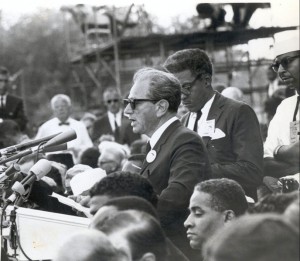This Wednesday evening Jews around the world will gather in synagogue to begin the Jewish New Year. Known as Rosh Hashanah (meaning “Head of the Year), this holiday centers around prayer, study and a festive meal.
It also begins the year 5774 on the Jewish calendar, reflecting the chronology of the Old Testament, where the calendar begins with the creation of the world.
The theme of Rosh Hashanah is best captured in a ritual item known as a shofar. A shofar is a ram’s horn sounded throughout the worship service on the day of Rosh Hashanah.
It calls us to look inside ourselves to see where we can grow and change. Rabbi Harold Kushner compared it to a wake-up call whose message is a challenge. Don’t just plead with me for a year of life. I’m giving you life; what are you doing with it.
In other words, the shofar pierces through our routines and habits. It awakens us from the slumber of everyday living. It challenges us to think, to question, to wake up!
What are we doing with the challenges and opportunities life puts before us? What meanings are we making out of the experiences we face? That is the question we grapple with during the Jewish New Year.
Ten days after Rosh Hashanah is the beginning of the Jewish holiday known as Yom Kippur. The phrase Yom Kippur means “Day of Atonement.”
Its central theme is making amends with God and with fellow human beings. An array of prayers reminds us to apologize and to forgive. Without doing so, we become trapped in the past. Yom Kippur helps us shape the future by coming to terms with our past.
A Rabbi and His Baby
A favorite story reminds me of this imperative to forgive. A fellow rabbi was giving a sermon on forgiveness. He mentioned the standard biblical passages And then he brought his one-year-old daughter up onto the pulpit. He kept going on with the sermon, as she played with his tie and kissed his cheeks.
Everyone chuckled and wondered what was going on. Finally he stopped and said, “Now is there anything she can do that we would not forgive her for.”
Most of the congregation nodded in recognition. Smiling, the rabbi waited for silence and then asked, “And when does that stop? When does it get so hard to forgive? At three? At seven? At fourteen? At thirty five? How old does someone have to be before we refuse to forgive?” (Also Recounted in Naomi Remen’s My Grandfather’s Blessing)
On Yom Kippur we ask ourselves what we are doing to forgive? Are we giving people the benefit of the doubt? Are we holding a grudge because it allows us to avoid doing something difficult? The prayers challenge us with these questions. We pray for God’s wisdom and our own strength to answer them.



